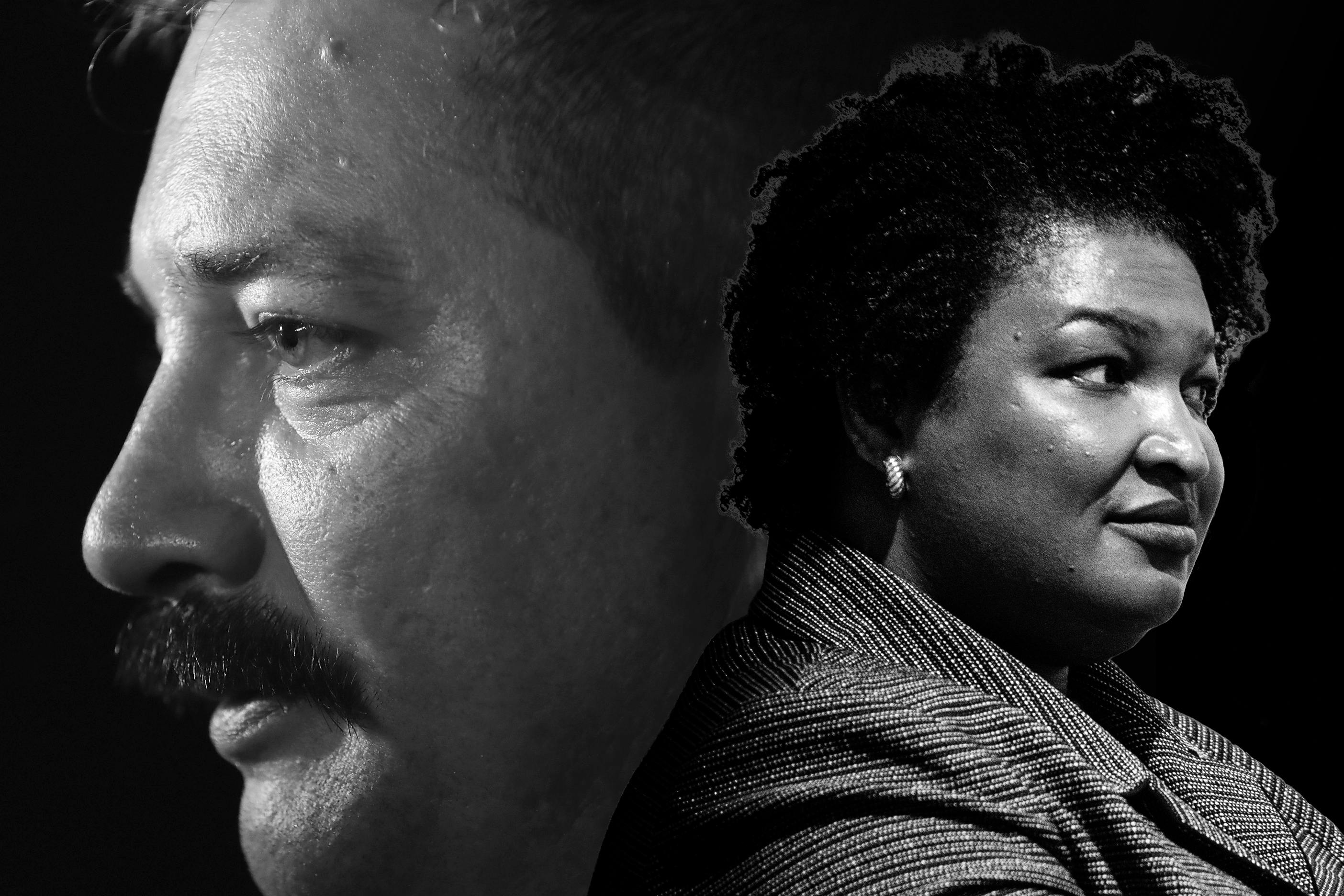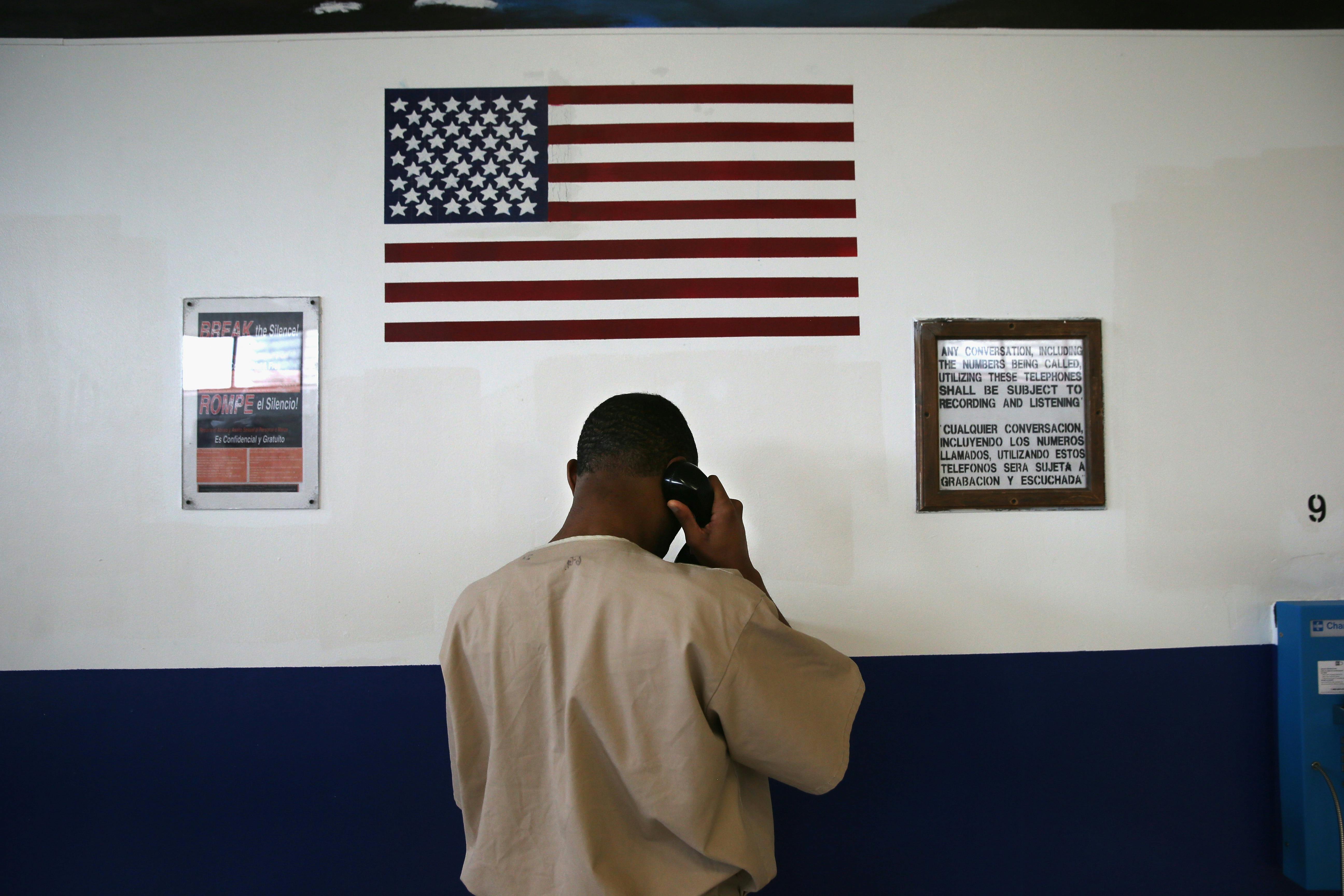
It’s a damning critique of President Donald Trump that his own staffers treated his relatively muted response to a sexual-assault allegation against Supreme Court nominee Brett Kavanaugh as a minor miracle. CNN reported earlier this week that aides were “quietly stunned” that he managed to not directly criticize Christine Blasey Ford as her account roiled Washington. “Hopefully he can keep it together until Monday,” an unnamed White House official told Axios on Thursday. “That’s only, like, another 48 hours right?”
He didn’t even last that long. Trump opened Friday morning by aggressively casting doubt on Blasey’s account, questioning why she didn’t report her allegations to law enforcement in the early 1980s, immediately after the alleged assault.
“Judge Brett Kavanaugh is a fine man, with an impeccable reputation, who is under assault by radical left wing politicians who don’t want to know the answers, they just want to destroy and delay,” he wrote on Twitter. Trump then criticized Blasey for the first time. “I have no doubt that, if the attack on Dr. Ford was as bad as she says, charges would have been immediately filed with local law enforcement authorities by either her or her loving parents,” he wrote. “I ask that she bring those filings forward so that we can learn date, time, and place!”
Trump knows full well that neither Blasey nor her parents filed charges or otherwise spoke to the police. She told The Washington Post that she didn’t share her account with anyone in detail until a therapy session with her husband in 2012. Trump’s goal is clear: to signal that she’s less credible because she didn’t turn to law enforcement at the time. But that’s the norm for crimes involving sexual violence. The Justice Department estimated in 2016 that only 23 percent of Americans who were raped or sexually assaulted that year reported it to police. Surveys attribute the low reporting rate to the trauma of sexual violence, the stigma that’s still widely attached to it, and the fear of retaliation and disbelief.
Those fears are well-founded. The Post’s Elizabeth Bruenig this week documented the story of Amber Wyatt, who in 2006 immediately reported her alleged rape by classmates when she was 16-years-old. She faced widespread social backlash for naming a popular soccer player as one of her assailants, and the investigation was incomplete at best. The Arlington, Texas police didn’t question either of her alleged attackers despite DNA evidence that linked one of them to the crime. Wyatt herself wasn’t even called to testify before the grand jury, which ultimately declined to indict the two boys. The #MeToo movement has made clear that Wyatt’s experience isn’t an isolated one.
Trump’s comments contribute to that problem. They also come as no surprise. The president routinely defends men accused of sexual misconduct and expresses disbelief towards the women who share their experiences with it. He described Roger Ailes as a “very, very good man” after the Fox News CEO stepped down after decades of sexually harassing dozens of women at the network. “I don’t think he did anything wrong,” Trump told reporters about Bill O’Reilly when the former Fox anchor’s multi-million-dollar sexual harassment settlements became public. After White House aide Rob Porter resigned after two of his ex-wives accused him of domestic violence, Trump highlighted Porter’s claim of innocence and wished him a “wonderful career.” He questioned why the women who said Alabama Senate candidate Roy Moore sexually assaulted them hadn’t come forward sooner. “He says it didn’t happen,” Trump remarked. “And you know, you have to listen to him also.”
The only exception to this pattern is when one of Trump’s political adversaries is accused of wrongdoing. After the Access Hollywood tape surfaced during the 2016 election, he held a press conference with four women who had accused Bill Clinton of harassment and assault. He has also relished the downfalls of Democratic lawmakers like Anthony Weiner and Al Franken.
Even before his comments on Friday, when he was being praised simply for not attacking Ford, the president made clear where he stood by repeatedly expressing sympathy for Kavanaugh, and none for Ford. “I feel so badly that he’s going through this,” Trump remarked on Wednesday. “This is not a man that deserves this.” The president speaks from experience. At least 19 women have publicly accused him of sexual misconduct, from harassment to assault and rape. Their allegations are how he knows that women often don’t report sexual violence to the police, and why he views it as a barometer of innocence: None of his accusers ever did.

Stacey Abrams is running for governor of Georgia, and she’s in debt. Throughout the summer, her opponent, Brian Kemp, criticized her for her financial situation, suggesting that funding a campaign while owing money to the IRS should be made “criminal.” In early August, the Republican Governors Association released a TV spot about her finances. “Stacey Abrams: a self-serving, fiscally irresponsible career politician,” the ad declared.
There is nothing new about conservatives pointing to personal debt as evidence that candidates are fiscally irresponsible, their unbalanced books a sign of some greater personal failing. As a campaign strategy, the criticism helps Republicans—with all their promises to rein in wasteful government expenditures—frame their liberal opponents as profligate spenders who shouldn’t be trusted to manage tax dollars.
Lately, however, the charge has been coming at Democratic candidates from people in their own party. Randy Bryce, the Bernie Sanders–backed Democrat running for Paul Ryan’s House seat in Wisconsin, went bankrupt in 1999, and has only recently paid off a delinquent car loan and $1,257 in late child support—facts that Cathy Myers, his opponent in the Democratic primary, returned to time and again this spring. (He won anyway.) In New York, Andrew Cuomo’s running mate, Kathy Hochul, has criticized Jumaane Williams, the democratic socialist running against her for lieutenant governor, for a home foreclosure he suffered in 2014. “Our NY state budget is $168.3 billion per year,” a recent attack ad charged. “If he can’t manage his own finances, do you really want him managing YOURS?”
In answering for their spending habits, women and people of color often face a particularly stark double standard. Donald Trump’s Supreme Court nominee, Brett Kavanaugh, has racked up tens of thousands of dollars in credit card debt to pay for home improvements and Washington Nationals tickets, and as recently as 2016, he owed up to $200,000 between three credit cards and a loan. Few people expected this to impede his nomination. And why would they? The man who chose him has a string of bankruptcies to his name, and his companies owe a reported $315 million to ten different financial institutions. Even Kemp, Abrams’s opponent, is being sued for allegedly failing to repay a $500,000 loan he had used to invest in an agricultural company. For Kemp and Kavanaugh, debt was simply the cost of an intrepid, entrepreneurial spirit; for Abrams, it was a serious offense.
/* ARTICLE 151132 */ #article-151132 .article-embed.pull-right { text-align: center; } @media (min-width:767px) { #article-151132 .article-embed.pull-right { max-width: 230px; text-align: left; } } #article-151132 .marginalia { padding: 10px; background: #c1e2e2; color: #353535; line-height: 1.4em; border-radius: 2px; } #article-151132 .marginalia h2 { font-size: 1.2em; margin: 0; line-height: 1.4em; letter-spacing: 1.2px; } #article-151132 .marginalia h3 { font-size: 1.1em; line-height: 1.4em; margin-top: 0; letter-spacing: 1.2px; } #article-151132 .marginalia p { font-family: "Balto", sans-serif; line-height: 1.4em; margin: 0; font-size: 1em; } #article-151132 smaller { font-size: .7em; display: inline-block; line-height: 1.2em; }Thomas Jefferson:
died $107,000 in debt incurred while building Monticello, collecting furnishings and wine
Abraham Lincoln:
spent years paying off debt on his general store
George McGovern:
sunk $700,000 into a Connecticut hotel that filed for bankruptcy in 1990, two years after he bought it
All may be fair in politics, but in an age when some 80 percent of Americans have personal debts, it’s not clear that denouncing people on the basis of what they owe is good campaign strategy. Student loan debt has almost tripled in ten years, and 26 percent of Americans under 65 are unable to pay their medical bills. The burden falls disproportionately on women, people of color, and young people—especially young people. Roughly 82 percent of millennials have debts. At least 63 percent owe more than $10,000 in student loans, 34 percent hold car loans, and another 46 percent hold credit card debt. And the wage gap means that many of them never reach the salary they’d need to pay off these bills.
That Abrams, Bryce, and Williams can understand these concerns may, if anything, make them more relatable, not less. The ways they fell into debt are hardly exceptional. Bryce, an ironworker, declared bankruptcy after he was forced to pay for cancer treatment without medical insurance. Williams’s home went into foreclosure after a restaurant he co-owned folded. Abrams took out loans to attend Yale Law School, and shouldered some of her family’s debt when her parents fell ill.
It is possible that these histories, which in the past may have been a liability, will prove to be an asset, resonating with the four out of five Americans who also owe money. “When you hear a candidate talk about their student loan debt, it’s not a turnoff,” said Lesley Lopez, a Democratic nominee for Maryland’s General Assembly. “It’s a sign the candidate understands what has become a generational struggle.”The sheer ubiquity of debt may have begun to change how Americans see the issue—as a structural condition, not a personal failing.
The sheer ubiquity of debt may have begun to change how Americans see the issue—as a structural condition more than a personal failing—and therefore how they see candidates who owe money. Democrats have plenty of good reasons to criticize Kavanaugh—his track record on the bench, for one, opposing abortion rights and environmental regulation; and whatever favors he may have gotten in return for buying tickets for Washington power brokers. But the mere fact of his credit card debt shouldn’t be counted among his faults, just as Abrams shouldn’t be kept from the Georgia governorship by her student loans, nor Williams barred from public service because he chose a bad adjustable-rate mortgage.
In the Trump era, as younger activists enter American politics, voters will likely encounter more candidates who owe money. These candidates may be wise to talk about their financial woes frankly. “As everyone following the race now knows,” Abrams wrote in Fortune in April, “I owe the IRS over $50,000 in deferred tax payments . . . and hold more than $170,000 in credit card and student loan debt.” Four weeks later, she won the Democratic primary.

George Alvarez spent four years in a Texas prison because a jail guard lied. The guard told prosecutors that the 17-year-old teenager had grabbed him by the throat while being transferred to another cell in a Brownsville detention center in 2005. Alvarez, a special-education student in the ninth grade at the time, pleaded guilty to assaulting a peace officer in exchange for a suspended eight-year prison sentence—so long as he completed a substance-treatment program. He did not, and began serving the eight-year term.
Halfway through his sentence, video footage came to light that prosecutors had never gathered from police officers, and thus never shown to the grand jury. The footage showed no such attack. Instead, the guard could be seen placing Alvarez in a choke hold and eventually a head lock while the young man flailed beneath him. His hands and arms were pinned down, nowhere near the guard’s throat. The Texas Court of Criminal Appeals found Alvarez to be “actually innocent” of the charges and vacated his conviction in 2010.
Alvarez then did what any citizen whose rights are violated can do: He sued the city of Brownsville, citing Supreme Court rulings that require the government to turn over exculpatory evidence in their possession to the defendant. This week, however, the Fifth Circuit Court of Appeals threw out his lawsuit, siding with the city’s defense that it wasn’t legally liable for the guard’s actions. But the judges also rejected Alvarez’s constitutional argument. Yes, the court said, prosecutors have to turn over evidence that may prove a defendant’s innocence for a criminal trial. But that constitutional right doesn’t apply when the defendant agrees to a plea bargain, they concluded.
How can that be? After all, plea bargaining is not some ancillary feature to the criminal-justice system. In many ways, it is the modern criminal-justice system. More than 95 percent of criminal cases are resolved through plea agreements in the state and federal systems. Jury trials, for all their ubiquity in American films and television shows, are now the exception instead of the rule. The result is a bureaucratized method of dispensing punishment, one that sometimes evades key protections for Americans’ constitutional rights.
Prosecutors are obligated under what’s known as the Brady rule to disclose any evidence in the government’s possession that may benefit a defendant’s case. The rule takes its name from the landmark 1963 case Brady v. Maryland, where the Supreme Court held that withholding exculpatory evidence violated a defendant’s right to due process under the Fourteenth Amendment. But the lower courts are divided on whether that also applies to the plea-bargaining process. The Supreme Court itself has never ruled on the matter.
Fifth Circuit Chief Judge Carl Stewart wrote in his thirteen-judge majority opinion that their court was bound by its own precedents, which narrowly interpret the Supreme Court’s rulings on the matter. “In sum, case law from the Supreme Court, this circuit, and other circuits does not affirmatively establish that a constitutional violation occurs when Brady material is not shared during the plea bargaining process,” he wrote. “The en banc court will not disturb this circuit’s settled precedent and abstains from expanding the Brady right to the pretrial plea bargaining context for Alvarez.”
The four dissenting judges noted that, under that precedent, Alvarez likely would have served his entire eight-year sentence had he been convicted of a federal crime in the Fifth Circuit’s jurisdiction instead of a state crime. “That is because we are the only federal court of appeals that has held that a defendant who pleads guilty is not entitled to evidence that might exonerate him,” Judge Gregg Costa wrote in his dissent. “Fortunately for Alvarez, and for those who believe that ‘justice suffers when any accused is treated unfairly,’ he was convicted of a state offense.” (Texas courts have ruled that the Brady rule does apply in state-level plea-bargaining cases.)
Plea bargaining’s flaws, as used on a massive scale today, are well established. The practice favors defendants with the financial resources to defend themselves at trial and disfavors poorer defendants who must instead rely on the overburdened public-defender system. Like virtually every other aspect of the criminal-justice system, it punishes non-white defendants more harshly than their white counterparts. Plea bargaining also shifts power away from judges and juries and hands it to state, local, and federal prosecutors instead. In doing so, it subverts the structural protections afforded to defendants by the Constitution.
Worst of all, the phenomenon appears to be sending countless defendants to prison who are actually innocent of the crimes for which they plead guilty. Thanks to the coercive power that flows from prosecutorial discretion and mandatory-minimum sentences, defendants may logically conclude that it’s safer to plead to a few years for a crime they didn’t commit than risk decades behind bars. Costa noted in his dissent that a nationwide registry for exonerations includes 73 Americans who had pleaded guilty to serious offenses like murder and manslaughter.
“And more than 10 percent of the 353 Americans whom the Innocence Project has helped exonerate through DNA evidence pleaded guilty,” he wrote. “Scholars believe false guilty pleas are even more common for less serious offenses when the cost-benefit analysis makes a plea that results in a minor sentence enticing.” Though precise numbers may be impossible to obtain, some researchers estimate that between 2 and 8 percent of people with felony convictions may be innocent.
In the worst cases, some of those guilty pleas may have been gained through coercion. A Connecticut court freed Bobby Johnson, who pleaded guilty to murdering a 70-year-old man during a 2006 robbery, after prosecutors acknowledged police misconduct in his case. Officers told him during his lengthy interrogation that he would face the death penalty if he didn’t confess to the crime, but would only receive probation if he did. Johnson, who was diagnosed with an IQ of 69, agreed to confess and received a 38-year prison sentence. Judges in Illinois tossed out cases connected to Jon Burge, the notorious Chicago police commander who oversaw the use of torture to extract false confessions from defendants for two decades.
Though cases like those represent the outer bounds of why innocent defendants may plead guilty, they vividly underscore the importance of skepticism towards the integrity of the plea-bargaining process. The lower courts are divided on whether exculpatory material should be provided during that process, so it’s possible that the Supreme Court could step in and clarify its ruling on the matter. That may not aid Alvarez or other Americans who have already been wrongfully convicted. But it could help those whose years have yet to be stolen.

No comments :
Post a Comment